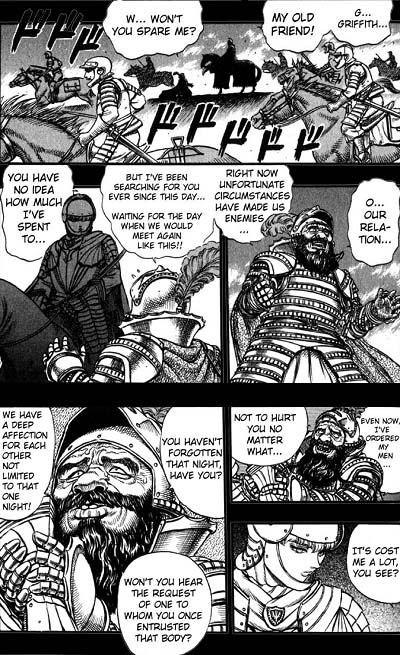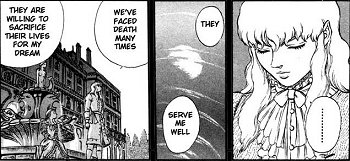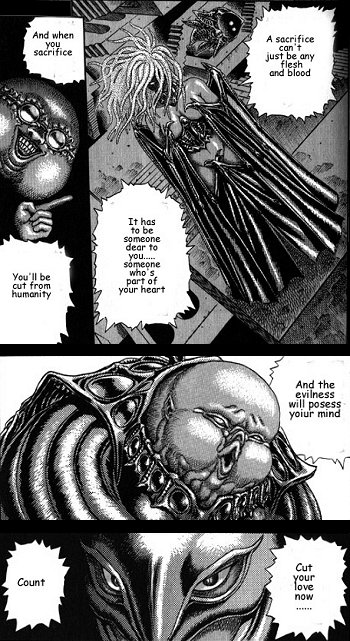| The
Nature of Sacrifice |

|
|

“They
are my valuable comrades, devoting themselves to the dream I envision.” Griffith, Vol. 6
Ch.
6
Griffith
never took anything that wasn’t his.
He had never lied about his intentions, or the lengths to which he would
go to see them done. His
wo/men admired him for that. All the Hawks swore to die for
his dream. Was his dream selfish? Maybe. That didn’t make it wrong,
and it didn’t make him evil to ask of his troops that which they would
freely give him: their loyalty, their lives. Sure, they expected the
sacrifice would take place on the battlefield, but it would still be a
sacrifice. There’s no fundamental difference between sacrifice on the
battlefield and sacrifice to demons... if both further Griffith’s dream,
heh. “I will
decide the place where you die.” Of course, Griffith
would never have sacrificed his men before the prison incident – he
had far too much confidence in himself for that! But with everything
else taken away from him, they were his last trump card, and he was
willing to use it. This raises the question of whether he cared about
his soldiers at all, or merely saw them as stepping stones on his path
to glory. |

|
|
“I
simply have no emotional interest in you at all. Resentment, endearment,
nothing. I just took the liberty of using you when the opportunity
appeared. You were like a stone lying by the side of the path I walk.
That, and nothing more.” Griffith, Vol. 8
Ch.
2
These
were
Griffith’s words to the Baron who he sold himself to when he was younger –
right before he killed him. Were those words meant purely for the Baron,
or could they apply just as easily to any member of the Hawks? Frankly,
at the point they were spoken, it was hard to tell, but let’s take
this one step at a time. No matter what Griffith
told himself or others, the night he spent with the Baron did traumatize
him. How much he repressed that pain by the time these words were spoken
is anyone’s guess. The reason he gave himself to the Baron at all was
because he wanted to lower the death toll of his troops, inspired by his
sympathy for a little boy that died under his command. This could be
interpreted in either a purely caring or a purely rational way, but that
boy’s appearance in Griffith’s guilty conscience showed it was at least both. The
stone metaphor
was later used by Guts to describe his leaving as “like
stumbling on a rock on the roadside” Surely we could all agree that it rocked Griffith’s world more than a
little rock. The only question that remains is...
How much did he care? |

|
|

“As
a sacrificial offering for the Invocation of Doom, not just any lump of
flesh will do. It must be someone important to you, part of your soul...
Someone so close to you that it's almost like giving up a part of you.” Slan, Vol. 3 Ch.
2
Ironically,
it is the fact that the Hawks qualified as sacrifices that proves how
much he loved them. You NEED people you care about for the ritual to
work! There is no way around this! In the past, people have sacrificed
their parents and their children... all who fit the Behelit's
requirement of "own flesh and blood." Perhaps blood ties are designed to
work by default, yet what Griffith sacrificed was much more significant:
emotional ties that matched, if not surpassed, the strength of blood
ties. |
|
|
| DISCLAIMER:
Berserk and all the characters, story, and art therein is copyright
Kentaro Miura. No copyright infringement is intended, and I hope that
this essay inspires more people to read/watch Berserk! Translation in
the text is by Dark
Horse, translation in the images is by The
Band of the Hawk, unless otherwise specified. |




